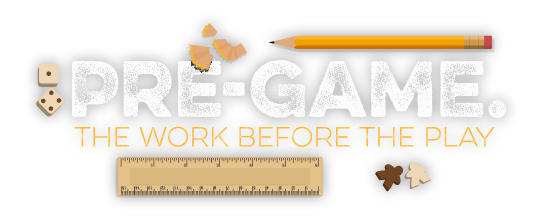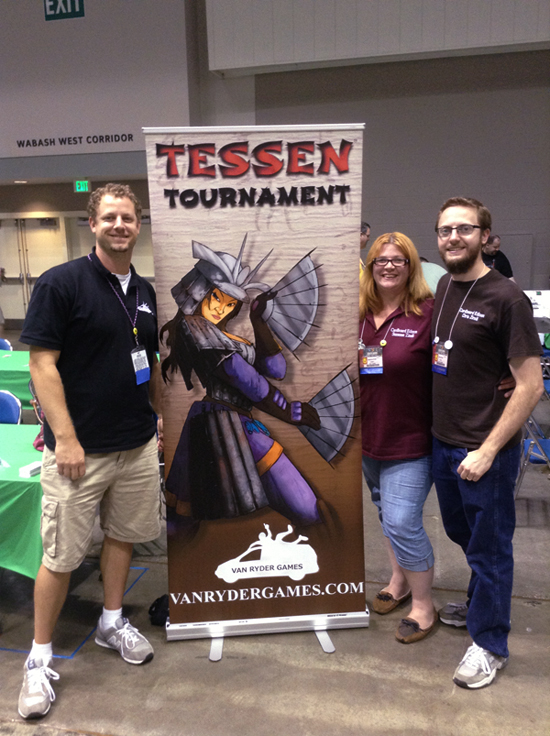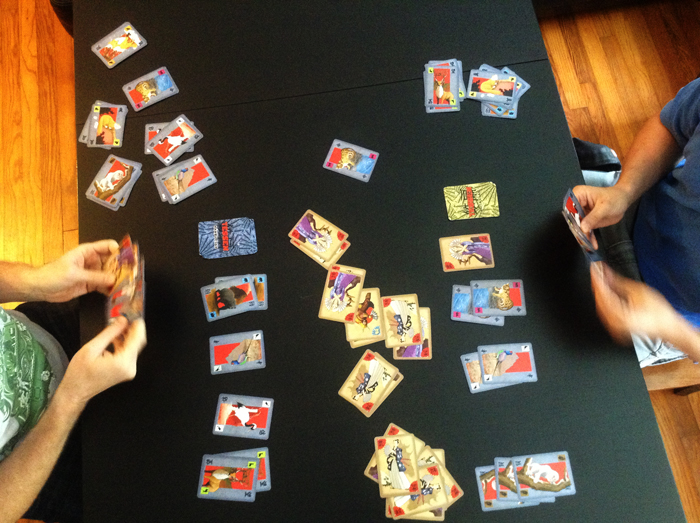
Tell us about yourself – Who are you? What do you do?
I am Suzanne Zinsli, one half of Cardboard Edison. We design games and run a board game design blog. I am also a mother to two amazing little girls, Lily and Hana, and a wife to one amazing husband, Chris Zinsli, the other half of Cardboard Edison.
This post has affiliate links, which directly support Andhegames.com at no extra cost to you. If you have any questions about anything recommended, let me know. – Andrew
If I’ve never played your games before, what’s the first one I should try?
Tessen: It is an intense 15-minute real-time card game.
One fact that we probably don’t know about you:
My favorite movie is Midnight in the Garden of Good and Evil. I liked the movie better than the book, which is very unusual for me.
What tabletop games (including digital board/card games) are you playing most right now?
Doing lots of playtesting, but for published games, Lost Cities, Belle of the Ball and Anomia all hit the table this weekend.
What are your all-time favorite tabletop games?
Tough question… I would have to say my tops are Panic Station, Captains of Industry and Mancala.
What draws you to make games?
I love the creativity, the process, the product, the people, and it is something that I get to do with my husband, Chris.
What are you not naturally good at, that you’ve learned to do for your work?
Staying up past 8 p.m. I am an early-to-bed, early-to-rise sort of girl, so those late-night development and playtesting sessions are brutal.
Describe your process (or lack thereof) when making games. How do you reach your final product?
It is a true back-and-forth between myself and Chris. One of us will come up with an idea that the other one likes, and then the fun starts. We run through some rough prototypes to see if there is anything there. If we have a game we want to focus on, we then do lots of development and playtesting… then some more development and playtesting. I don’t know if a product is ever really final, but I guess once it is in shrink wrap I would consider it done.
What game design-related media do you consume on a regular basis?
Cardboard Edison tries to cover all the design-related material out there…but there is just so much great advice and articles, I am sure we are just reaching the tip of the iceberg.
What are some tool/programs/supplies that you wouldn’t work without?
Index cards and a notebook. Index cards are so versatile, you can use them for almost any aspect of prototyping. Nothing beats a notebook for brainstorming and writing down playtest feedback.
What’s your playtesting philosophy? How often/early do you playtest?
My philosophy is that you can never playtest enough. Keep playtesting and then playtest some more! I like to do a rough concept playtest to see if an idea has potential and if it is worth pursuing and further development. Once there is a presentable prototype, I try to playtest at least once per week.
What are some of the biggest obstacles you’ve faced in your work, and how have you overcome them?
Finding time is a huge obstacle. I have two daughters, one is 6 and the other is 8 months. They keep me uber busy. Actually, while I am doing this interview, the 6-year-old keeps running over to me to ask for help with something…haha. I try to dedicate certain times each week to work on game design, usually when one is in school and the other one napping.
How do you handle life/family/work balance?
Luckily, my husband is my design partner, so we are in this together. It has truly become a part of our everyday life. We still struggle to find a balance… sometimes we spend too much time on game design, other times we are doing lots of family activities and our design work stalls. Sometimes life also just makes you put everything on pause. About a year ago, there was so much going on in my personal life that I put all design work on hold until I felt I was able to return to it with a clearer mind.
How many hours/week do you generally devote to game design? How many to other business-related activities?
We spend around five hours a week on our game designs, then around 10 hours on our blog and around seven hours of playtesting other designers’ games.
What one piece of advice would you give aspiring game designers?
Immerse yourself in the community! The gaming community is very welcoming, and in my experience designers are always eager to help other designers.
Who would you like to see answer these questions?
Doug Levandowski, Matthew O’Malley and Vital Lacerda.
What’s the best advice about life that you’ve ever received?
Always tell the people you love that you love them.







